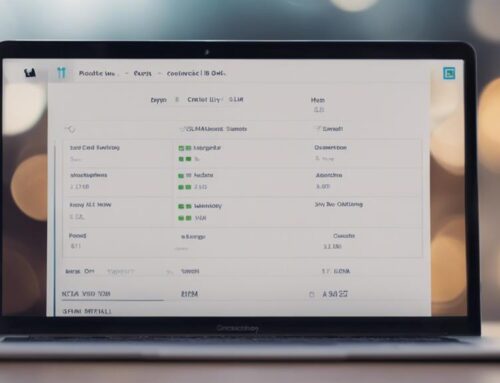Managing data effectively requires essential systems. Database Software orchestrates information efficiently, aids analysis, and ensures swift retrieval. Information Storage focuses on accessibility and archival, boosting retrieval speed. Data Organization employs a systematic classification for streamlined management. Record-Keeping maintains accuracy and reduces errors, ensuring consistency across departments. Data Security & Backup safeguard valuable data with encryption and disaster recovery measures. These five systems are vital for optimizing data handling and ensuring security.
Key Takeaways
- Database Software: Enables efficient data organization and analysis.
- Information Storage: Enhances data retrieval speed and accuracy.
- Data Organization: Optimizes storage and retrieval through systematic classification.
- Record-Keeping: Maintains organized and accurate data records.
- Data Security & Backup: Safeguards data with encryption, backups, and disaster recovery plans.
Database Software
When considering data management systems, database software plays a crucial role in organizing and storing information efficiently. Database software is essential for conducting data analysis and ensuring seamless system integration. It allows you to retrieve data quickly and accurately, enabling you to make informed decisions based on real-time information.
One of the key benefits of database software is its ability to facilitate data analysis. By structuring information in a way that is easily accessible and understandable, it empowers users to extract valuable insights and trends from large datasets. Additionally, database software supports system integration by providing a centralized platform where different applications can interact and share data seamlessly.
Moreover, database software offers opportunities for software customization, allowing you to tailor the system to meet your specific needs. Whether it’s creating custom reports, implementing unique data structures, or integrating third-party tools, customization options ensure that the software aligns perfectly with your data management requirements. By leveraging these features, you can optimize data storage and retrieval processes, enhancing overall efficiency and productivity.
Information Storage
Efficient data management relies heavily on effective strategies for information storage. When considering information storage, two crucial aspects to focus on are data retrieval and data archiving. Data retrieval refers to the process of accessing and recovering specific information from storage systems efficiently. By organizing data in a logical and structured manner, you can enhance the speed and accuracy of data retrieval, saving valuable time and resources. On the other hand, data archiving involves storing data that is no longer actively used but may need to be retained for compliance or historical purposes. Implementing a robust data archiving system ensures that older data remains accessible while freeing up primary storage space for current data. By strategically managing information storage through optimized data retrieval and efficient data archiving practices, you can streamline data access, improve overall data organization, and enhance the performance of your data management system.
Data Organization
To optimize data management efficiency, a systematic approach to data organization is essential. Data classification plays a crucial role in structuring information based on predefined categories. By categorizing data according to its type, importance, or any other relevant criteria, you can streamline the storage and retrieval process. Efficient data classification ensures that similar data is grouped together, making it easier to locate and manage. When organizing your data, consider implementing a hierarchical structure where information is arranged in a logical order, enabling quick access to specific data points.
Moreover, data retrieval is simplified when information is well-organized. By establishing clear naming conventions and metadata tags, you can enhance search capabilities and locate data swiftly. Utilizing a consistent file naming system and adding relevant keywords to documents can significantly improve data retrieval efficiency. Remember, the key to effective data organization lies in creating a system that is intuitive and user-friendly, facilitating seamless access to information when needed.
Record-Keeping
Establishing a robust record-keeping system is vital for maintaining accurate and organized data within your organization. By implementing electronic filing solutions, you can streamline the process of storing and retrieving important records. Electronic filing allows for efficient categorization and easy access to documents, reducing the risk of human error often associated with manual record-keeping. Additionally, data tracking tools can provide valuable insights into the lifecycle of your records, including when they were created, accessed, and modified.
Utilizing electronic filing systems enables you to create a centralized repository for all your records, promoting consistency and standardization across departments. This not only enhances data integrity but also facilitates collaboration and information sharing among team members. Moreover, data tracking functionalities can help you monitor the usage and compliance of your record-keeping protocols, ensuring that sensitive information is handled securely.
Data Security & Backup
Creating a secure data storage environment is fundamental for safeguarding your organization’s valuable information. When it comes to data security and backup, implementing robust encryption protocols and establishing clear data retention policies are crucial. Encryption protocols ensure that your data is protected from unauthorized access, adding an extra layer of security. Additionally, having well-defined data retention policies helps in efficiently managing data storage and ensuring compliance with regulations.
In the realm of data security, disaster recovery planning plays a vital role. By having a solid disaster recovery plan in place, you can mitigate the impact of unforeseen events on your data. This includes regularly backing up your data to secure offsite locations, ensuring that you can quickly recover in case of data loss or system failure. Moreover, incorporating ransomware protection measures is essential to prevent cyber threats and potential data breaches. By staying proactive and implementing these strategies, you can fortify your organization’s data security and ensure business continuity.
Frequently Asked Questions
How Does Data Management Impact Overall Business Performance and Decision-Making Processes?
When managing data effectively, you enhance efficiency and enable strategic decision-making. Data impacts business performance by providing insights for informed choices. Ensure data quality and accessibility to optimize operations and drive growth.
What Are the Key Differences Between Cloud-Based Data Management Systems and Traditional On-Premise Solutions?
In comparing cloud-based data management systems to traditional on-premise solutions, you’ll find that the former offers scalability and flexibility, while the latter provides greater control over data security and customization options.
How Can Data Management Systems Help Organizations Comply With Data Protection Regulations Such as Gdpr?
To comply with data protection regulations like GDPR, data management systems assist in ensuring data privacy and security. By implementing robust policies and controls, organizations maintain compliance, safeguarding sensitive information and mitigating risks effectively.
What Are Some Common Challenges Organizations Face When Implementing a New Data Management System?
When implementing a new data management system, common challenges you may face include ensuring data security, maintaining data quality, aligning with existing processes, training staff effectively, managing costs, and integrating with other systems seamlessly.
How Can Data Management Systems Integrate With Other Software Applications to Streamline Processes and Improve Efficiency?
To integrate data management systems with other software applications for streamlined processes and improved efficiency, focus on seamless data integration and optimizing workflows. Ensure compatibility, automate data transfers, and use APIs to enable smooth communication between systems, enhancing overall operational effectiveness.




